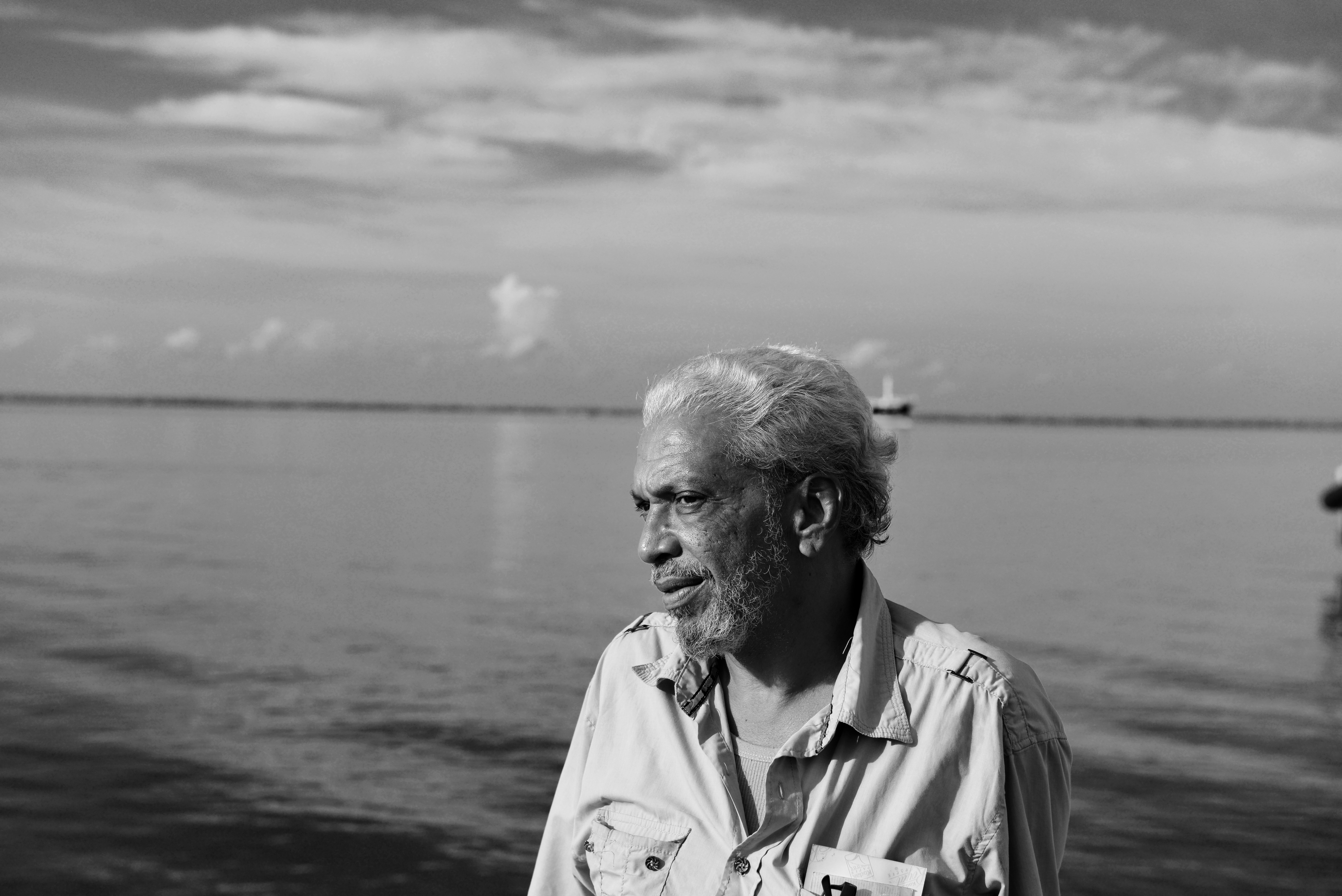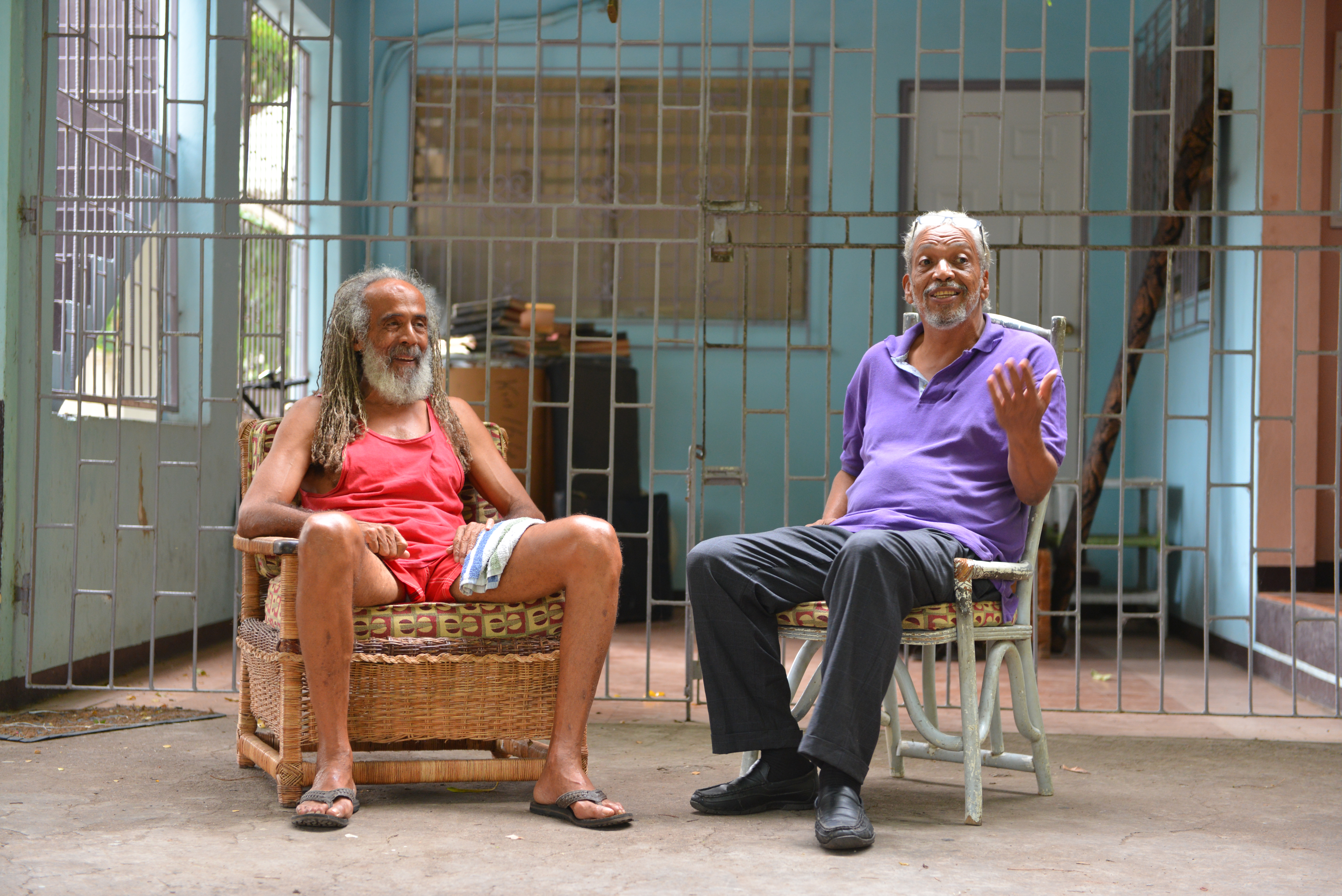13 September 2014
Driving around Trench Town with Ivan Coore

Ivan Coore , Kingston Harbour, 2014 ©derek bishton
IVAN COORE, who died on September 7, 2019, came from one of Jamaica’s elite families. His father David Coore was a lawyer who helped draft the Jamaica Constitution in 1961 and later served as Michael Manley’s deputy in the People’s National Party Government of the 1970s. His younger brother Steven ‘Cat’ Coore is a founder member of the legendary Third World reggae band. Ivan became a Rasta in the early 1970s while still at school and in 1973, at the age of 19, accompanied Vernon Carrington – Brother Gad, founder of the 12 Tribes of Israel Rasta mansion – on a fact-finding visit to Ethiopia. He subsequently decided to stay and study at the University in Addis Ababa. The following is a transcript of Ivan talking about the turbulent times he lived through in Ethiopia following the overthrow of HIM Haile Selassie, recorded while we were driving around Trench Town, Jamaica, in 2014.
The social conditions in Jamaica in the late 60s were of increasing wealth for the rich while the poor were getting poorer. Politics in independent Jamaica was centred around two parties and this tended to create divisions amongst people who would naturally have been united, but now, because of politics, became divided. So areas became marked as PNP or JLP areas, and there was inter-community violence based on which party you belonged to. And on top of that there was the ever-present threat of police intimidation and police brutality.
Most of this was directed against black consciousness movements. In the late 60s it was illegal to have any book that advocated black power. If you were found with a book by Malcolm X, Stokely Carmichael or Walter Rodney you could be arrested and imprisoned. And this is a black nation and these are books by black people written on behalf of black people. But our government saw it fitting to ban these books. So all of this generated a sort of social antagonism that resulted in violence and people feeling dispossessed and that there was no future for them here.
So the call of the Back to Africa movement became very strong and appealing. The visit of his Imperial Majesty to Jamaica in 1966 caused a huge awakening of African consciousness and increased dramatically the desire and the number of people who wished to eventually get to Ethiopia.
The people who live in a poor area, normally one would expect that they would be united in a common purpose, to escape from poverty; that they would be driven towards unity, but the reality was that they were encouraged to be divided by joining a political party. If you didn’t join a party you would find yourself as a total outcast – which most Rastafari did. And politicians coerced whole areas to swear allegiance to them and this could only be done if there was a violent enforcer, somebody who was armed who could turn threats into reality. So it was a political act that created antagonism in the ghetto. And on top of this you had the security forces who were programmed to oppress poor people and the principal way they did this was through ganja, the anti-ganja laws.
In 1973 I was chosen to be part of an Ethiopian World Federation delegation, at the tender age of 19 having a wife – Joan (Hosang) – and child, I left Jamaica and went to Africa, landed in Addis Ababa 25th May, OAU anniversary. (1)
Our mission to discover what we could about Shashemene and the other land settlements wasn’t very successful and when the time came to depart I made a decision to stay and was accepted into the Haile Selassie I University. I was supported in this decision by my family and so I went back to Jamaica for my wife and child and started at the university on September 16, 1973 which happened to be the period just prior to the Ethiopian revolution, so right away there was tension and everything was not as we had been led to believe in the west where we thought everything was alright with His Majesty’s regime.
So by the end of my first semester, I was very happy, I had done very well, good grades, I was very happy. And I was able to get things done for the Shashemene settlement. Early in 1974 my dad visited – he was the Minister of Finance in the Jamaican government – and he agreed to provide support for the Shashemene settlement, and then the Minister of Foreign Affairs, Dudley Thompson visited and he confirmed that they were going to provide financial support for Shashemene and this was excellent because early in February, when the troubles really started, the university closed and I was now left with an uncertain future. Fortunately I was offered a job with the embassy and it was really in connection with the expected aid that was coming because they would need a field officer and that was my job. The money came in June so I decided, and my wife agreed, that we should move to Shashemene as life in Addis was becoming increasingly tense and uncomfortable.
By September 1974, Africa’s 9/11, the Emperor was deposed on 11 September and on the 12th the military council formed the government. We had been using the assistance in Shashemene to do our farming. This was a shocking time, a time of great self-introspection, as a group we were questioning everything. But we had faith that the scriptures were right and that this was part of the plan and we should just work with it. We had difficulty of how the revolution was carried out. They tried to spread lies and negate all the good things that the Emperor had done.
The military government nationalised all the land, but we went ahead and continued planting our crops but by March 1, 1975 our land was invaded by Ethiopian peasant farmers and who interpreted the nationalisation of land meant that our land should be confiscated so they came and took it and said we should return to Jamaica.
When we reported this to our embassy their response was to offer all of us a ticket back to Jamaica. A member of their staff, an Ethiopian lady, suggested that we do like other Ethiopian groups who had been similarly disenfranchised since the military takeover and write a petition to the military government, which we did and 20 persons signed it. Approximately 11 persons accepted the embassy’s offer.
We presented the petition on 21 August, which turned out to be the day they announced His Imperial Majesty’s death. That was a shock but we went ahead and presented the petition – myself and Noel Dyer – and we saw the surprise on the soldiers’ faces that we had even turned up. Anyway, they accepted our petition and two weeks later the embassy was informed that it was not their intention to take away the land but the quantum had to be re-examined because we were living in an area where the average landholding was five acres and there was no way they could allow us to have 25 acres each. They agreed to give five acres to each of the signatories to the petition but we would have to work it communally and without hiring any local labour. So a month or so later they came down and surveyed the land and we had 100 acres instead of the original 500 acres.
The Derg came to power on a platform that presented them as moderate and aligned to the west. It was presented as a peaceful revolution. But 71 days into their regime they committed a massacre and their true nature was revealed. They executed 60 prisoners – nobles – who were part of HIM’s regime. Many Left wing students and teachers who had been His Majesty’s fiercest critics now became the target of the Derge’s drive to radicalise the country because they wanted a civilian government. Many middle and upper class people fled the country. Anyone who showed the slightest dissent was arrested, tortured and then disappeared.
During this period, the resistance to the Derge was increasing and their response was to become more hardline. In some areas it was close to civil war. In Addis you had bands of urban militias roaming around looking for people who were breaking the curfew. It wasn’t a good time to be an Ethiopian who had some money.
My wife had our second child in Shashemene in April 1975. Our daughter was born just after they took the land. Most of 1975 was a time of uncertainty. I had lost my job at the embassy because when they offered the tickets for returning to Jamaica that was the end of my job, and by the end of the year my wife was pregnant again with our third child. We agonised over it and we decided that, in early 1976, it would be best for her to return to Jamaica with the children. To make even one journey to Addis meant being stopped up to 20 times and there was sporadic violence all over the countryside. So she left at the end of March 1976.
There was trouble because the teachers were expected to be part of the Ethiopian Revolutionary Party which was violently opposed to the Derge. They organised sabotage. There was basically a civil war. The rebels would attack soldiers, and government installations. And the Derge responded by rounding up known activists and revolutionaries and killing them.
It was quite common to be going to work in Addis to see dead bodies stacked up with a sign saying this was the fate of the enemies of the revolution. Basically it was not a good time to be in Ethiopia because if you were with the Derge you could be killed, and if you were against the Derge you could be killed.
We were happy that we had our little corner where we could stay quietly out of the way. Great things happened because Allan Cole, one of Jamaica’s best footballers came to Ethiopia. He made a great impression and he was offered a job to coach the Ethiopian Airlines football team.
(1) The delegation consisted of Bro Gad, aka Vernon Carrington, Bro Levi aka Ivan Coore, and Bro Benji aka Lascelles Laird
These comments from Ivan were made while driving around Kingston in 2014 while Giulia Amati was working on her film Shashamane.
Ivan Coore (Bro Levi) June 17, 1953 – September 7, 2019
Allan ‘Skill’ Cole and Ivan Coore at Cole’s house in Vineyard Town, Kingston 2014 ©derek bishton

